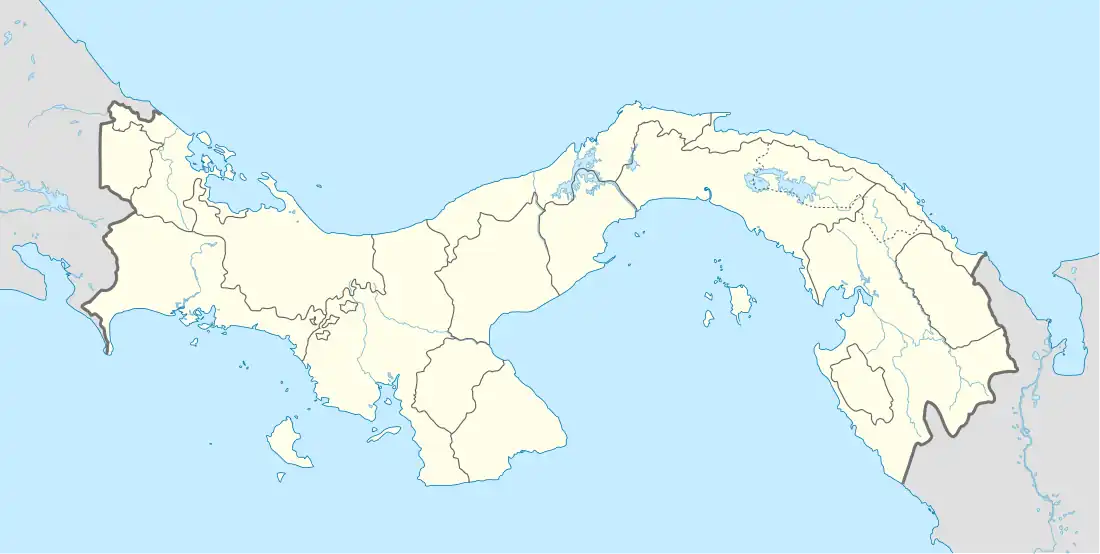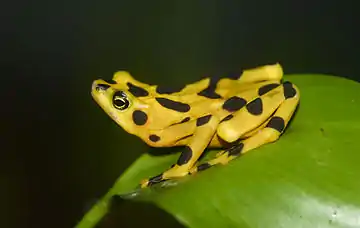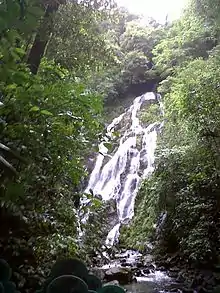El Valle de Antón | |
|---|---|
.jpg.webp) El Valle at night | |
 El Valle de Antón | |
| Coordinates: 8°36′03″N 80°07′49″W / 8.6008°N 80.1303°W | |
| Country | Panama |
| Province | Coclé |
| Area | |
| • Land | 34.8 km2 (13.4 sq mi) |
| Population (2010)[1] | |
| • Total | 7,602 |
| • Density | 218.6/km2 (566/sq mi) |
| Population density calculated based on land area. | |
El Valle de Antón, generally called El Valle, or Anton's Valley in English, is a town of 7,600 in the Coclé province of Panama.
Geography

The town is located in the flat wide caldera of the 6 km wide El Valle volcano that is inactive; there is evidence that it erupted as recently as about 300,000 years ago [2] Because of its elevation (600 m), it is cooler than the Panamanian lowlands.[3] Natural attractions near El Valle include the Chorro El Macho waterfall, Las Mozas waterfall, the "square" trees behind Hotel Campestre, and a group of small thermal pools (which consist of three cement pools of mineralized water that varies in color depending on the specific minerals present at a given moment).[4] The area around the town is also known for being one of the last habitats of the critically endangered Panamanian golden frog.[3] Some of the forests around the town are protected areas.[3]
Demographics
El Valle had a population of 7,602 as of 2010.[1] In 2000 its population was 6,175; in 1990 it was 4,900.[1]
Features


El Valle has one main road, called Avenida Central or Calle Central, which runs east–west across the town.[5] A main landmark is the town's public market, which is open seven days a week, although it is sometimes referred to as El Valle's Sunday Market.[6] El Valle has a very small historical and geological museum, as well as a small zoo (El Nispero, named after a type of tree), a small serpentarium, a butterfly house, and an orchid conservation center, called APROVACA, which displays over 100 native local orchid species.[7] There are also several petroglyphs west of town that are known as La Piedra Pintada.[8]
Some of the people who own properties in the heart of El Valle are wealthy people from Panama City who use the area as their vacation or weekend home.[9] Popular activities in the area include cycling, hiking, horseback riding, and birdwatching.[9] El Valle is home to around 500 species of birds.
The town is about 25 km off the Interamerican Highway by a two-lane road. The road is generally in good condition, with a few potholes that are repaired regularly. Buses, usually mini-buses, to Panama City are frequent and take approximately 2.5 hours. As of 2014, the last direct bus to Panama City leaves El Valle at 3pm with a fare of $4.25. To reach other locations in Panama, it is generally necessary to take a bus to San Carlos and transfer there. As of 2014, the last bus from El Valle to San Carlos leaves at 6pm.[10]
Sources
Notes
- 1 2 3 4 "Instituto Nacional de Estadística y Censo - Panamá". contraloria.gob.pa (in Spanish). 2015-07-10. Archived from the original on 2015-07-10. Retrieved 2020-01-22.
- ↑ Defant et al. 1991: Andesite and dacite genesis via contrasting processes: the geology and Geochemistry of El Valle Volcano, Panama; Contrib. Mineral. Petrol., v. 106, p. 309-324
- 1 2 3 Friar, p. 226.
- ↑ Friar, pp. 226, 229, 231.
- ↑ Friar, p. 226-27.
- ↑ Friar, pp. 226, 229.
- ↑ Friar, pp. 226-29.
- ↑ "La Piedra Pintada".
- 1 2 Friar, p. 230.
- ↑ Friar, p. 236.
Works cited
- Friar, William. Panama. Moon Publications (2008). ISBN 1-59880-085-X.
- Reid, Robert et al. Central America on a shoestring. Lonely Planet (2007). ISBN 1-74104-596-7.
